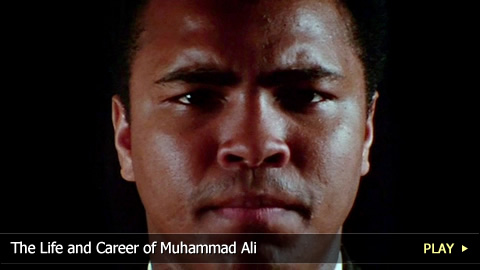The Life and Career of Muhammad Ali

advertisement
VOICE OVER: Rebecca Brayton
Born Cassius Marcellus Clay, Jr. on January 17th, 1942 in Louisville, Kentucky, Muhammad Ali got into boxing before he was even a teenager. He won gold in the 1960 Summer Olympics and quickly attracted attention with his frequent victories and unique fighting style. After converting to the Nation of Islam in the 1960's, Ali continued to make a name for himself by participating in several fights against notable boxers and won the heavyweight title three times. In this video, http://www.WatchMojo.com take a look at the life and career of Muhammad Ali.
Introduction to Boxing
Cassius Marcellus Clay, Jr. was born on January 17th, 1942 in Louisville, Kentucky. He was twelve when he was introduced to boxing by policeman and boxing coach Joe E. Martin. He soon began to train and participated in several amateur boxing matches.
Gold at the Summer Olympics
After winning several Golden Gloves titles, Clay won the Light Heavyweight gold medal in the 1960 Summer Olympics. Shortly thereafter, he won his first professional fight against Fayetteville police chief Tunney Hunsaker, and Angelo Dundee became his trainer.
Early Victories
Throughout the early 1960s, Clay began to attract attention with his frequent victories and regular knockouts. During this period, he defeated notable boxers such as Doug Jones, Henry Cooper, and Archie Moore. He also developed a fighting style that depended on speed, especially that of his feet.
Heavyweight Champion
In 1964, Clay had an unexpected victory against the current heavyweight champion Sonny Liston. At twenty-two, he became the youngest boxer to take the world heavyweight title from the reigning champ.
Conversion to Nation of Islam
Soon after, Clay announced his membership to the Nation of Islam and adopted the name Muhammad Ali. That same year, Ali refused to serve in the U.S. Army, asserting his status as a conscientious objector to the Vietnam War.
More Wins
The next year, he won a rematch with Liston by knockout and fought Floyd Patterson in the second defense of his title. He won several more bouts against opponents such as George Chuvalo, Brian London and Karl Mildenberger.
World Record
There were a few other notable fights during this time. These included his 1966 victory against Cleveland “Big Cat Williams,” which drew an indoor world record of over thirty-five thousands fans. Another was his brutal fight against Ernie Terrell in 1967.
Boxing License Suspended
Later that year, Ali was found guilty of refusing induction into the army. He was subsequently stripped of his boxing title and had his professional license suspended. As the years went by, opposition to the war began to grow. While his case was still on appeal, certain states and boxing commissions allowed Ali to fight.
First Professional Loss
Despite winning a few bouts in 1970, Ali experienced his first professional loss against reigning heavyweight champion Joe Frazier in 1971. The highly anticipated match came to be known as “The Fight of Century.”
Return to the Ring
His conviction was reversed a few months later and he returned to the ring. After a series of exhibition matches known as the “Muhammad Ali Boxing Show” as well as a few other fights, Ali defeated Frazier in a 1974 re-match.
Rumble in the Jungle
Next up was the Don King-promoted fight “The Rumble in the Jungle.” Ali tired out his much younger opponent George Foreman through the use of a boxing style that came to be known as the Rope-a-Dope strategy. The surprising win allowed Ali to reclaim the title of Heavyweight Champion of the world.
Thrilla in Manila
Following bouts against Chuck Wepner, Ron Lyle and Joe Bugner, Ali took on Frazier for the third time in 1975. The highly anticipated Don King-promoted fight dubbed the “Thrilla in Manila” resulted in Ali’s second victory against Frazier.
More Fights
The next year, Ali won a number of bouts against fighters such as Jimmy Young and Richard Dunn. He then fought an exhibition match against wrestler and martial artist Antonio Inoki and won his third fight against Ken Norton.
Three-Time Heavyweight Champion
After several victories the next year, Ali fought two matches against 1976 Olympics Champion Leon Spinks in 1978. He lost the heavyweight title in the first fight but won it back in a re-match later that year. This victory made him boxing’s first three-time heavyweight champion.
Final Fight
After losing to Larry Holmes in 1980, Ali participated in his final fight in 1981. He was defeated by the top heavyweight contender at the time, Trevor Berbick. Though he was diagnosed with Parkinson’s syndrome a few years later, Ali remained active in civic and humanitarian projects following his retirement.
The Greatest
Once nicknamed “The Greatest,” Muhammad Ali defeated every top heavyweight in his generation, and his story has inspired millions.

